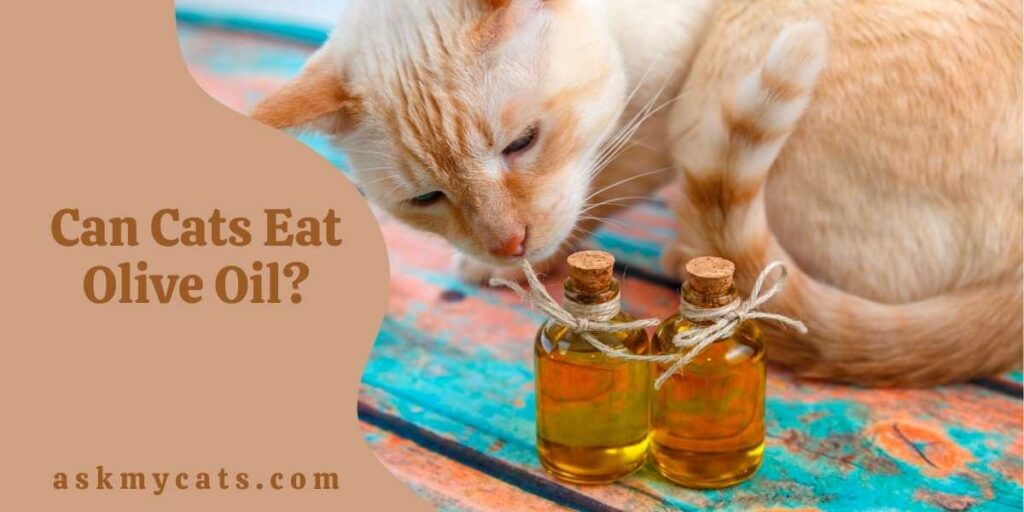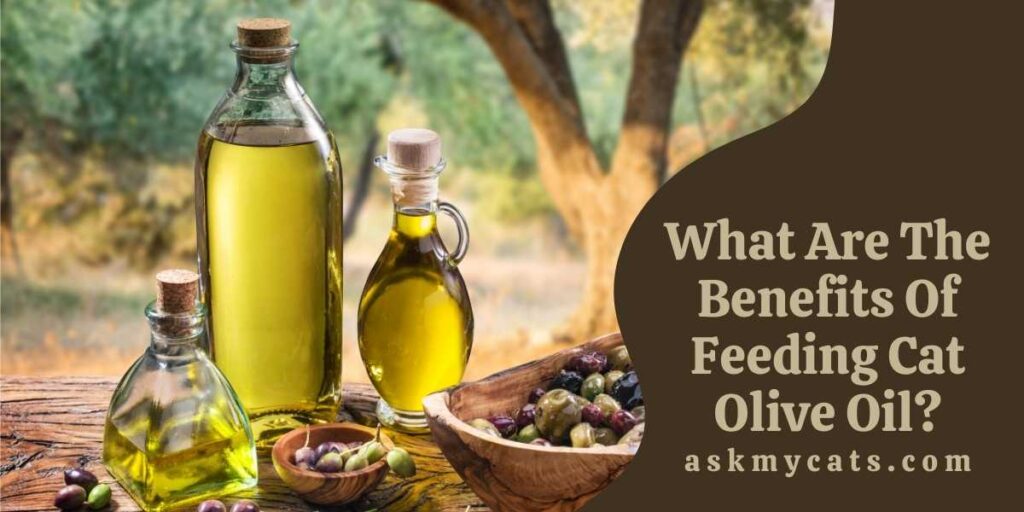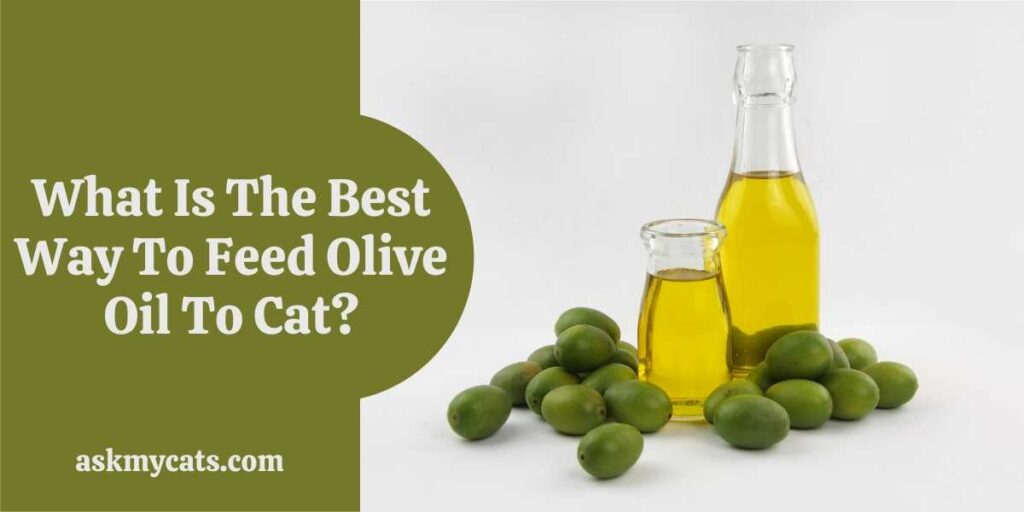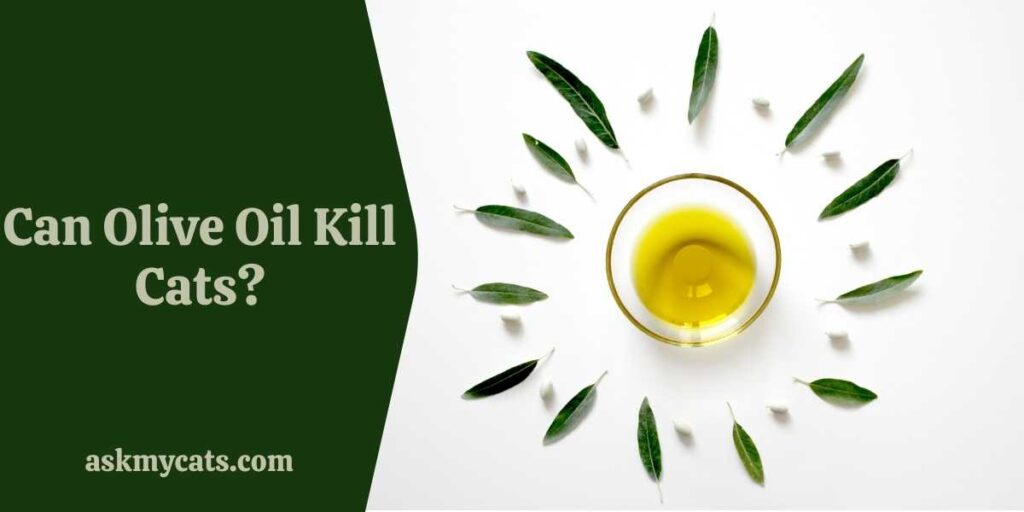Olive oil has become a staple in many kitchens, owing to its status as a ‘superfood’. It has incredible antioxidant capabilities, enhances the flavour of cooked foods, and is generally beneficial to humans.
But, because what’s beneficial for humans isn’t often good for other cats, if you use it frequently in your cooking and have cats, you’ve probably pondered (or worried) about their exposure to it.
Cats, in particular, are notorious for sneaking a sample of whatever you’re cooking if they get the chance.
So, can cats eat olive oil?
Yes, cats can eat olive oil. Although cats are not poisoned by olive oil, consuming too much of any fat, including olive oil, might cause diarrhoea and vomiting in your cat.
Keep reading things article and by the end of it, all your doubts regarding olive oil and cats will be cleared.


Give Your Cat the Perfect Day
Get the Free Ebook!
Is Olive Oil Toxic To Cats?
No, olive oil is not toxic to cats.
Olive oil is not considered a harmful food, and most cats can safely take it.
This also applies to cat-safe items such as chicken that you may have cooked with olive oil. Some spices and other ingredients in recipes, on the other hand, can be poisonous to cats.
If you plan to share things like a chicken with your feline, make sure they’re plain except for the olive oil.
Cats are not poisoned by olive oil. Olive oil, in fact, can be a beneficial addition to a cat’s diet. To put it another way, olive oil is not only healthy for cats, but it is also good for their diet and overall health.
Olive oil is fairly affordable and accessible, in addition to having pure good benefits for your cat’s health. It’s available in any grocery or health food store.
Many people wonder how much olive oil a cat can eat. 1-3 times a week, add one tablespoon of olive oil to your cat’s diet. Mix thoroughly to ensure that the oil is absorbed by the food. That’s all there is to it.
If you’re going to feed your cat olive oil, extra virgin is the finest option if you can afford it. The reason for this is that it hasn’t been chemically processed and is hence less acidic.
This means that cats will be more safer. It’s of much superior quality and will prevent your cat from being ill.
There isn’t a set amount of medication that a cat should take. One tablespoon every day for constipated cats and one teaspoon every 2-3 days for their coat, according to some experts.
It’s a good idea to start with a modest dosage to see how your cat reacts.
What Are The Benefits Of Feeding Cat Olive Oil?
The benefits of feeding cat olive oil are: –

1. Boosts Your Cat’s Immune System
Olive oil is high in antioxidants. There’s a reason why olive oil is considered a superfood by some.
Chlorophyll, polyphenols, and Vitamin E are all present.
These are three substances that can aid in the improvement and enhancement of your cat’s immune system. This means that your cat will be better equipped to resist pathogens.
Extra virgin olive oil is less acidic and hasn’t been chemically treated, so it’s safer for cats to eat. Extra virgin olive oil is also of superior quality, ensuring that your cat does not become ill.
Olive oil has also been linked to brain and joint health in studies. Both are critical for senior cats with hip dysplasia, elbow dysplasia, arthritis, and osteoarthritis.
2. It Has Monosaturated Fats
We’re often concerned that some oils are bad for our cats since they can cause diabetes or heart disease.
Olive oil, on the other hand, will help your cat burn fat more efficiently and accelerate its metabolism.
3. Helps In Weight Loss
Is your cat a little heavier than he or she should be? Olive oil can be beneficial. It will aid in the acceleration of metabolism and the breakdown of fats accumulated in cells. Your cat’s risk of heart disease and stroke is lowered when they are at a healthy weight.
4. Can Cure Constipation In Cats
Have you ever dealt with a constipated cat? If that’s the case, you’re well aware of how inconvenient it may be for both you and your cat.
Furthermore, the prescription to help your cat re-establish its normalcy is costly. Olive oil can aid in bowel movement stimulation.
But don’t give them too much because it will make their stools softer and perhaps induce diarrhea.
Constipation in cats can be treated naturally with olive oil. It has a laxative effect and may aid in the removal of hairballs.
As a hairball remedy, it is recommended that you mix one teaspoon of olive oil into your cats’ diet for three days.
In general, it is suggested that you begin by giving your cats tiny amounts of olive oil and gradually increase the amount. You can feed one teaspoon every three days for conditioning.
5. Beneficial For Their Fur & Skin
Olive oil is an excellent moisturizer. This will make your cat’s coat softer to the touch.
Olive oil’s hydrating characteristics make it ideal for boosting the gloss and suppleness of your cat’s fur.
It will also keep their skin hydrated and healthy. Finally, olive oil can aid in the removal of any hairballs lodged in a cat’s throat.
6. Natural Cure For Ear Mites
Check with your cat’s veterinarian to see whether they recommend using olive oil. However, it is frequently used to remove ear infections and ear mites. Drop a few drops of the oil into your cat’s ear to accomplish this.
Check with your veterinarian to see whether this is something they recommend, especially if you’re not sure how to put drops in your cat’s ear.
What Is The Best Way To Feed Olive Oil To Cat?
The best way to feed olive oil to your is by adding one teaspoon to your cat’s regular food two or three times a week.

Because olive oil is fat, you should limit its use in your cat’s diet unless your veterinarian advises otherwise.
Adding one teaspoon of olive oil to your cat’s usual meal two or three times a week is a piece of common advice.
Also, double-check that the olive oil you’re feeding your cat is genuine. Because the market is rife with fake olive oils, check for one that says “first cold-pressed” on the label and specifies the country of origin.
It’s safe to add to their dry or wet meals. Giving it to them with a syringe or by itself is not a good idea. It won’t go down well with your cat.
If you decide to give your cat olive oil, you should get extra-virgin olive oil if it is within your budget.
Extra-virgin olive oil is less acidic and hasn’t been chemically treated, so it’s safer for your cat to eat. Extra-virgin olive oil is a higher-quality oil that will prevent your cat from being unwell.
However, one thing to keep in mind about olive oil and extra virgin olive oil: it should never be used as your cat’s primary source of fat.
This is due to a deficiency in omega-6 and omega-3 polyunsaturated fatty acids, which are important fatty acids that cats cannot make on their own and must get from food in order to thrive.
Do Cats Like Olive Oil?
Whether a cat will like olive oil or not is completely dependent on its personality and preferences as each cat is different.
I’ve never heard of a cat actively searching out olive oil, but cooking with it doesn’t prevent them from eating it. It’s likely that cats aren’t overly fond of olive oil.
They won’t be lured to it since it isn’t a meat product that cats are wired to eat, but they also won’t avoid it because it doesn’t have much of a taste or odour that cats would find repulsive.
There’s nothing in olive oil that makes cats dislike it and nothing about it that makes them love it.
Some cats won’t take it straight from the bottle because of the texture, but they won’t mind if it’s used to cook chicken or other meat.
They won’t actively seek it out; most cats are more interested in the meat or whatever else was cooked in olive oil.
Can Olive Oil Kill Cats?
No, olive oil cannot kill cats as it is totally non-toxic.

Olive oil is completely harmless to cats; they’d have to consume a lot of it to become sick to the point of death.
Olive oil, on the other hand, isn’t something cats should consume on a regular basis. Olive oil is a plant-based oil that cats are unable to digest, putting additional pressure on their bodies.
Olive oil is likewise heavy in fat, and while it’s mostly a beneficial fat, it’s still a fact that cats don’t need to consume in large amounts. Olive oil, which acts as a laxative, can also cause diarrhoea in cats.
Olive oil, on the other hand, has some advantages when used in tiny doses and provided your cat can handle it.
If your cat ate some olive oil, just monitor them for a few days afterwards and make sure that they don’t get much worse than a gross litter box.
If your cat has an unexpected reaction to olive oil, stop using it and consult your veterinarian.
Itching, sneezing, lethargy, temporary loss of appetite and dry skin are all symptoms of an allergic reaction in cats.
If you’re giving your cat olive oil for the first time, keep an eye on it to make sure it doesn’t have a negative reaction.
Frequently Asked Questions
Extra virgin olive oil vs oil olive. Which is better for cats?
You’ve probably heard that extra virgin olive oil is superior to normal olive oil in terms of health benefits. This holds true for cats as well. Extra virgin olive oil is prepared by pressing the oil from the olives using only natural methods and then going through additional quality control procedures. Regular olive oils frequently contain other oils that were extracted from the olives with the use of solvents and other chemicals to make the process less expensive and faster.
Why does more vet don’t recommend olive oil?
It’s not so much a matter of veterinarians not suggesting it as it is the reality that many foods already contain olive oil. However, check the ingredient label on your cat’s food to make sure you’re not giving your cat too much olive oil. Finally, experts always recommend speaking with your veterinarian about whether or not olive oil is safe for your cat. Although not every cat needs an olive oil supplement, if your cat suffers from constipation or has a dry/rough coat, it may be a good idea to discuss this natural supplement with your veterinarian.
Can cats eat olives?
When cats are young, they are allowed to consume olives. Eating olives does not make cats toxic. They contain several vitamins and are frequently touted as a major component of a healthy Mediterranean diet. Last but not least, if your cat eats olives with pits, they might become choking dangers. Remove the pits before offering olives to your cat. Blue cheese, almonds, garlic, sausage, or pickled jalapenos are frequently put into olives for human consumption. While olives themselves are not poisonous to cats, the materials with which they are packed may be. Avoid offering your cat olives stuffed with anything other than pimento or olives with pits since pits can cause choking or intestinal obstruction if ingested.
Final Words
We don’t think of olive oil as a superfood for cats, and while it isn’t as beneficial to cats as it is to us, it does have certain advantages. However, you must be careful not to overuse it, because your cat may develop diarrhoea or become ill.
Because it’s still a rich oil, too much olive oil over a long period of time can cause your cat to gain weight rather than lose it, which can lead to issues like joint pain and diabetes later in life.
Allowing a cat to eat something like olive oil should be done with caution. Also, keep in mind that many cat feeds already include olive oil (or fish oil), so adding extra on top of that may cause more harm than benefit. Before you go out and buy more cat food, look at the ingredients to see what’s in it.
If you have any questions, ask us in the comments section.
